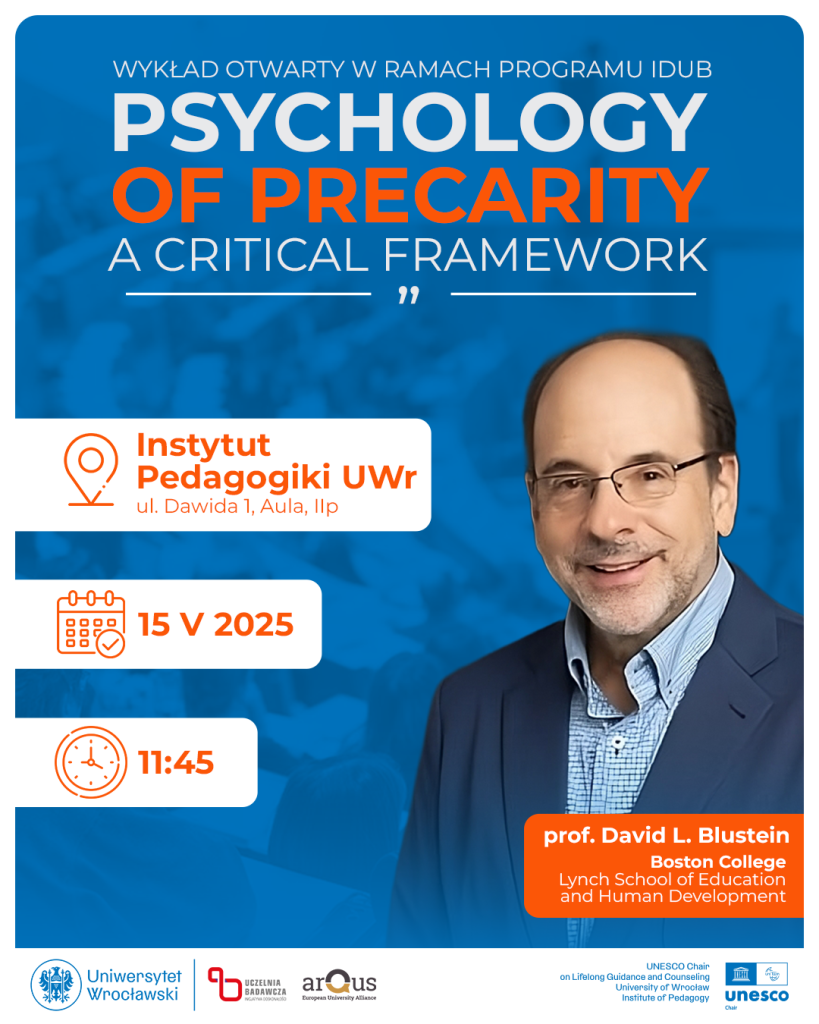
Psychology of Precarity: A Critical Framework
The Institute of Pedagogy, University of Wrocław, and the UNESCO Chair Lifelong Guidance and Counseling invite you to the open lecture: Psychology of Precarity: A Critical Framework by Prof. David L. Blustein (Department of Counseling, Developmental, and Educational Psychology, Boston College, Lynch School of Education and Human Development, USA).
15 May 2025 (Thursday)
11.45 am
Institute of Pedagogy, 1 Dawida Street, 2nd floor lecture theatre

The lecture is part of the Visiting Professors Programme under Task No. 9 IDUB of the Excellence Initiative – Research University (IDUB).
Abstract:
Given growing levels of crises and instability facing people across the globe, a new perspective may be useful in understanding the intersection of structural and systemic issues with relational, work/career, and psychological functioning. Emerging from multiple disciplines, including anthropology, cultural studies, sociology, political science, career guidance, and psychology, the concept of precarity provides a conceptual scaffolding for understanding the complex causes of precarious life circumstances while also seeking to identify how people react, adapt, and resist the forces that evoke such tenuous psychosocial experiences. The presentation concludes with implications of precarity for psychological interventions, with a particular focus on vocational, mental health, and organizational psychology contexts.
Profile:
David L. Blustein is a Professor and the Golden Eagle Faculty Fellow in the Department of Counseling, Developmental, and Educational Psychology at Boston College. Dr. Blustein is the author of The Psychology of Working: A New Perspective for Career Development, Counseling, and Public Policy and The Importance of Work in an Age of Uncertainty: The Eroding Experience of Work in America. He has instrumental in developing psychology of working theory, which represents an inclusive and social justice-informed perspective on the role of work in people’s lives and in their communities. Dr. Blustein has contributed numerous articles and book chapters on psychology of working theory, unemployment, career development/counseling, psychotherapy, decent work, dignity at work, psychology of precarity, relationships and work, social class, race, and other aspects of contemporary working. He also has consulted with national and international organizations, such as the International Labor Organization, OECD, and the United Nations Development Program.
More information about the guest speaker on the Boston College website: https://www.bc.edu/bc-web/schools/lynch-school/faculty-research/faculty-directory/david-blustein.html
Professor D. Blustein’s lecture is part of the regular seminars held at the UNESCO Chair. This time it will be the 18th Scientific Seminar.
Boston College, Lynch School of Education and Human Development is one of 24 universities affiliated to an international collaborative network around the Chair – UNITWIN NETWORK Life Designing Interventions (counseling, guidance, education) for decent work and sustainable development / Life Designing for sustainable development and decent work (counseling, guidance and education).
You are cordially invited.

As part of IDUB’s visiting professors programme, classes will also be held for UWr Doctoral School students and Counselling students: Psychology of working and new directions in career guidance
The topics to be covered in the workshop include: Psychology of Working: Theory and Practice, Relational Theory of Working, Relationships and Work, Making Work Better, New Directions in Career Guidance, The Future of Work, Dignity at Work, Conversations about Career Guidance in the Age of Precarity,
Meetings will be held at the Institute of Pedagogy on:
13 May, 9:00–13:30
22 May – 09:00 – 13:30
If you are interested in participating in the workshop, please send your application to violetta.drabik-podgorna@uwr.edu.pl.
